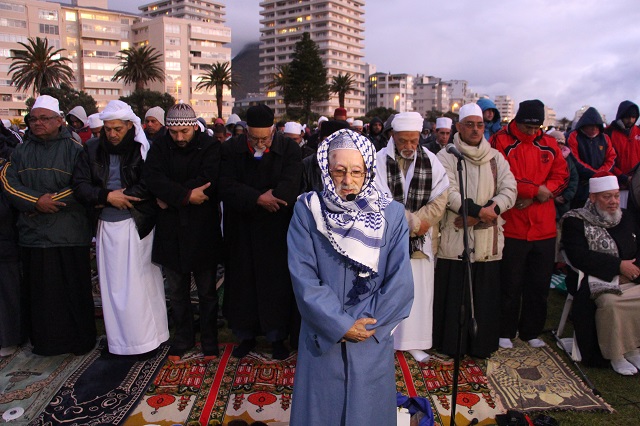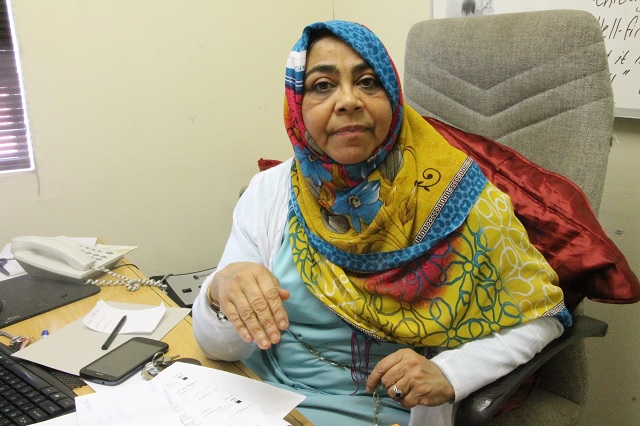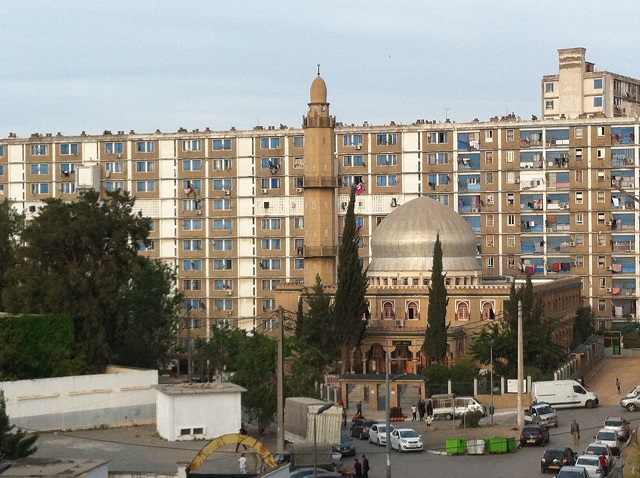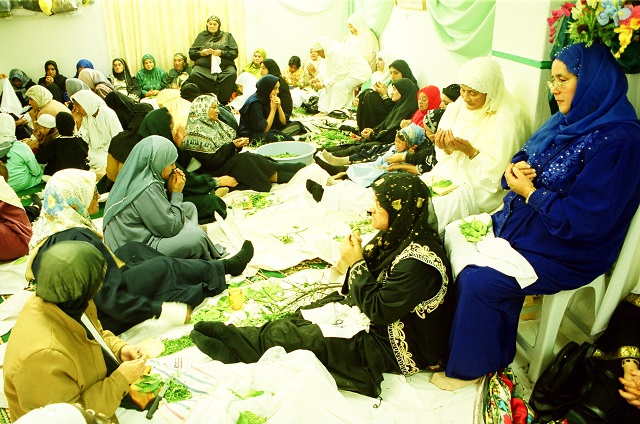What sharia law means, and how it is understood throughout the world
By Larbi Megari*, Yazeed Kamaldien* and Muna Abdelfattah*
COURTESY : http://globalplus.thearda.com/

Imagine a beautiful garden, filled with vibrant flowers, trees bursting with fruit and rivers flowing throughout a paradise-like setting.
That is how Fodil M., a volunteer imam and a director in Algeria’s Religious Affairs ministry, views Sharia, a system of divine guidance for nearly every aspect of Islamic life, from prayer and ritual worship to charity and kindness to others.
For Fodil, as for hundreds of millions of Muslims, Sharia is a way or a path to divine understanding that enables human beings to reach their full potential.
So why, he and other Muslims wonder, does so much public conversation about “Sharia” or “Sharia law” focus not on its role in the everyday lives of Muslims, but on the weeds of extremism, intolerance and ignorance surrounding the garden.
The answers are complex, involving historical, political, cultural, regional and religious factors that need to be understood in context.
But complexity and reason are often difficult to find amid the emotion and politics attached to Sharia.
In the West, where Sharia is often conflated with the actions of terrorist groups who commit acts of violence in the name of Islam, Muslims face bigotry and discrimination that include legal restrictions on how and where they can practice their faith.
In Muslim-majority nations, Sharia also is often manipulated into a source of suffering and conflict, most painfully in the civil wars overwhelming nations such as Syria, Iraq and Afghanistan.
But there is hardly a nation where Islam is the majority faith that does not face political challenges related to the interpretation of religious law.
In Egypt, the military exploited fears of Sharia law to topple a democratically elected government, returning authoritarian rule and widespread human rights violations to a nation that had been at the forefront of the Arab spring.
In Indonesia, a secular democracy, the Christian governor of Jakarta was recently found guilty of blasphemy. Responding to attacks during an election campaign, he said that his opponents were misleading Muslims by saying the Quran forbids them from voting for a non-Muslim. He was sentenced to two years in prison for insulting Islam.
What many Muslims interviewed in recent weeks throughout the world say they want is for Sharia to be separated from politics and understood primarily as a way for human beings as individuals and parts of communities to become closer to the divine.
Such knowledge starts in part by listening to a Muslim bookkeeper in South Africa who performs her daily prayers behind a closed office door at work.
“Islam is a way of life and governs all aspects of our lives,” Adilah Shaide says. “It governs us socially and spiritually. Islam has guidelines on how to live with your parents, family and neighbors. It is about living in a community. When we pray, it is communal and we don’t pray only for ourselves.”
It is more about relationships than a question of civil law, she says.
“Allah has 99 names and each name shows His qualities. You must implement these qualities in your life; like compassion, forgiveness, mercy and love,” according to Shaide. “You can’t show gratitude to your creator if you can’t show it to mankind.”

Myths and realities
Sharia represents how practicing Muslims can best lead their daily lives in accordance with God’s divine guidance. The guidance is based on the Quran and the Sunnah, revelations of God to the Messenger of Islam. The human interpretation of sharia is called “fiqh,” or Islamic rules of right action.
In many ways, Sharia can be compared to the collected wisdom of any religious group taken from Scripture, practices and teachings developed and interpreted over centuries with the idea of helping individuals live their lives in accordance with divine will.
And as in other faiths, the authority of the divine is embraced, but with a recognition human beings are imperfect interpreters.
Here are some common myths about Sharia:
Myth: There is only one way to interpret Sharia and Sharia law.
Reality: There are several schools of Islamic thought, including the Ja‘fari, the Hanafi, the Maliki, the Shafi΄i, the Hanbali, the Zaidi, the Ibadi and the Zahiri. Scholars from different traditions and within traditions do not agree on a single interpretation. The differences multiply exponentially when deciding on how to apply Sharia in modern society, and its place in civil law.
Myth: Sharia law is focused on punishments such as stoning for adultery and cutting off a hand for theft.
Reality: Sharia is traditionally divided into ibadah, which means ritual worship, and fiqh, which means jurisprudence of transactions. Hudood, or punishments, represent just about 10 percent of any fiqh book. The medieval punishments so often held up as illustrative of Sharia are almost never implemented in any modern state.
Myth: Muslims throughout the world want Sharia law to be the civil law of the land.
Reality: Most Muslims, like devout members of any faith group, would like to see basic moral principles of their religion such as prescriptions against violent crime or care for the needy reflected in public policy. But, for the most part, Muslims in countries where they are a minority just seek freedom to practice their faith. And where they are a majority there are great differences of opinion on the application of Sharia to public laws.
What is and has been true for other belief systems throughout history, from the promotion of atheism in China and secularism in France to preferential treatment for Catholicism in much of Latin America and Orthodox Christianity in Russia, is also true for Islam: The relation between faith and public life is evolving.

Nation by nation
Consider how issues of Sharia are particular to the different national circumstances in which they arise.
Algeria: The nation is still recovering from the more than 300,000 lives and billions of dollars lost in the “dirty war” of the 1990s sparked by a military coup that overturned the election of groups seeking the application of Sharia law.
There are still armed people in some mountain areas of Algeria fighting for the same cause. And heated debates about Sharia continue in the public arena between religious and secular parties.
Yet Algeria laws today remain mostly secular.
Many citizens who remember “The Black Decade” of the 1990s are wary of implementing Sharia law.
Before talking about the punishment part of Sharia, “we should talk about its biggest part, the part concerned with organizing people’s daily life in harmony, tolerance and love,” said Mourad, 46, a radio journalist.
Baaziz, a shop owner in Algiers, believes in the divine nature of Sharia law, but is wary that religious parties are using religion for temporal aims.
“These political parties need to know that Sharia-based criminal law is only a tiny part of the great Sharia; the biggest part is between each person and Allah.”
France: Sharia requires Muslims to pray five times daily and women to wear a hijab, or head covering. French law places legal restrictions on doing either practice in public.
Add to these limits on religious freedom a rising far-right movement and challenging economic and social conditions for many young Muslims and there are increasing concerns of deteriorating relations with its largest religious minority.
A poll of French Muslims by Institut Montaigne found that 29 percent of respondents desired to have Sharia laws as their first source of legislation.
What that reflects is a growing alienation felt by Muslims in France, a sense of claiming a religious identity that is being taken away from them, said Mohammed, 46, a doctoral student.
Unlike Muslims in Britain, Mohammed said, “French Muslims are not feeling French.”
French Muslims do not want Sharia law to be incorporated into French law, said Faycal, 46, who holds a doctorate in sociology from a Paris university.
“All Muslims want is freedom within French laws,” Faycal said.
South Africa: Islam first arrived in the country from South East Asia in the mid-1600s during the Dutch colonial period. During the colonial period and after that apartheid rule, Muslims were at times prohibited from practicing their religion.
But the faith survived, and gained new life with the fall of apartheid in 1994. The new constitution guaranteed freedom of religion.
That does not means Muslims do not face prejudice.
In January, a man called for a mosque in a small coastal town, Langebaan, to be burned down. A week later, two mosques in two other coastal towns – Simon’s Town and Kalk Bay – were vandalized, with pig’s blood smeared at the entrances of the mosques.
Some residents of mostly white areas, in what some say is a hangover from the apartheid past, also have been active in opposing the construction of mosques in their neighborhoods. Muslims are largely from the coloured, or mixed-race part of the population, and Indians.
Yet Muslims say for the most part they are free to practice their religion.
“As South African Muslims, our country’s democracy affords us the kind of freedoms that other political systems in other parts of the world might not provide for their citizens,” said Sheikh Isgaak Taliep, secretary-general of the Muslim Judicial Council, an Islamic authority based in Cape Town. “We are largely afforded the opportunity to practice a lot of the aspects of Islam.”
Sheikh Riad Fataar, an imam from Cape Town and leader of the city’s Imamat Council of Northern Suburbs, said Sharia requires Muslims to follow the laws of the land as long as it does not contradict Islam.
“In fact, to love your country is part of your faith,” he added.
Two other nations with very different experience are the Sudan and Turkey.
The sudden adoption of an extreme form of Sharia law in the Sudan in 1983 was part of a process of more than three decades of violence and conflict that has devastated civilian populations with genocide and famine, most notably in Darfur. South Sudan broke off as an independent nation in 2011.
In Turkey, however, a history of military takeovers of civilian governments led secular and religious groups to stand together last year to preserve their democracy and stop an attempted military coup against President Recep Tayyip Erdogan, who is open about his faith in an historically secular state.

Moving forward
There is hope for a more nuanced understanding of Sharia law.
The temptation in the face of civil unrest or political instability or the threat of terrorism is to clamp down on religious and civil freedoms, especially those of minority groups.
But several national and international studies show such policies do not work.
“We find just the reverse happens,” said U.S. sociologist Roger Finke of Pennsylvania State University, a leading researcher on religious freedom.
Restricting the freedoms of one religious group creates higher levels of tensions, increases the risk of violence and persecution and is associated with greater loss of freedom for majority and minority faiths alike, he said.
Where there is a rising Islamaphobia, it should be a concern of all citizens, Muslim leaders in South Africa noted.
“All South Africans should embrace their fellow citizens and defend their rights. The Muslim community is part of South Africa. We need to come together,” said Shuaib Appleby, an Islamic educator.
Yet, one cannot come together in fear.
Nor can it be accomplished without understanding.
A 2010 University of Munster study of more than 1,000 respondents from five Western European nations indicated that having personal contact with Muslims was strongly related to favorable attitudes toward Islam in every country.
For example, in the former West Germany, 38 percent of respondents who reported a lot of contact with Muslims reported very positive attitudes; only 1 percent of respondents who had no contact held very positive attitudes toward Muslims.
In fact, whether it is U.S. Christians favoring the Bible as a source of law or Algerian Muslims seeking the same for Sharia, “Most believers desire a system of government in which religious principles and democratic values coexist.” John Esposito, a professor of international affairs at Georgetown University,” noted in a paper on “Rethinking Islam and Secularism.”
In listening to the voices of global Muslim neighbors, one hears in their understanding of Sharia echoes of the earthly paradise, or what Christians and Jews might imagine as a Garden of Eden, envisioned by Fodil, the Algerian official.
“Believing in Allah makes you more conscious of how you treat others,” said Zubeida De Villiers, a receptionist in Cape Town who wears a hijab and prays at her office.
“You have more compassion towards others.”
Baaziz, the Algerian shop owner, said he trusts God, but not politicians.
Fixing his gaze directly at a reporter as the interview comes to an end, Baaziz said he understands it is not possible at this point in history to have Sharia written into civil law, but it is nice to think about.
“Look, you know, I want Sharia to be practiced so Islamic political parties disappear, because they will find no reasons to exist anymore.”
*Larbi Megari is a television journalist and freelance writer based in Algeria.
*Yazeed Kamaldien is a journalist, photographer and documentary filmmaker based in Cape Town.
*Muna Abdelfattah is a freelance writer and editor based in Saudi Arabia and a researcher in political science at the University of Khartoum in Sudan.
Resources: Association of Religion Data Archives: Search nearly 1,000 surveys and find citations for several hundred journal articles for comprehensive information on topics such as Sharia, Islam and religious freedom. ARDA National Profiles: View belief, demographic, socio-economic and public opinion data for all nations with populations of more than 2 million. Al-Islam.org: The site, available in seven languages, is designed to digitize and present on the Internet quality Islamic resources, related to the history, law, practice, and society of the Islamic religion and the Muslim peoples. Articles: Bayuni, Endy. GlobalPlus: Democracy & Islam. The overview explores how two of the largest Muslim-majority nations in the world are prospering under democracy. “Democracy in both countries has strengthened in spite of, or because of, the rise of political Islam,” notes Mr. Bayuni. Bin Ahmad, Nisar Mohammad. The Islamic and International Human Rights Law Perspectives of Headscarf: the Case of Europe. This article explores the issue of legal restrictions on the wearing of head scarves from the perspectives of freedom of religion, freedom from discrimination and the right to education and work. Gillani, Waqar. GlobalPlus: Religion and violence: Pakistan’s story. How extremist organizations that preach violence have gained such a foothold in Pakistan is less a story of faith than a textbook example of the cycle of violence and conflict that erupts when governments and political interest groups use favoritism and coercion to manipulate religion to their own ends. Inam, Hüseyin, Power and Authority in Religious Traditions in Islam: Reflections about issues of power and authority in the traditions and the present situation of Muslims in Europe. The article states that Islam contains a lot of positive potential for interpretation, but “most non-Muslims very often get an impression of Islam as presented to them by the media and by public opinion. This image is necessarily political and, more often than not, negative.” Books: Grim, Brian, and Finke, Roger, “The Price of Freedom Denied: Religious Persecution and Conflict in the Twenty-First Century.” The book provides a compelling argument that religious freedom serves to reduce conflict, while restricting religious freedom is a path to religious persecution and violence. |  |









